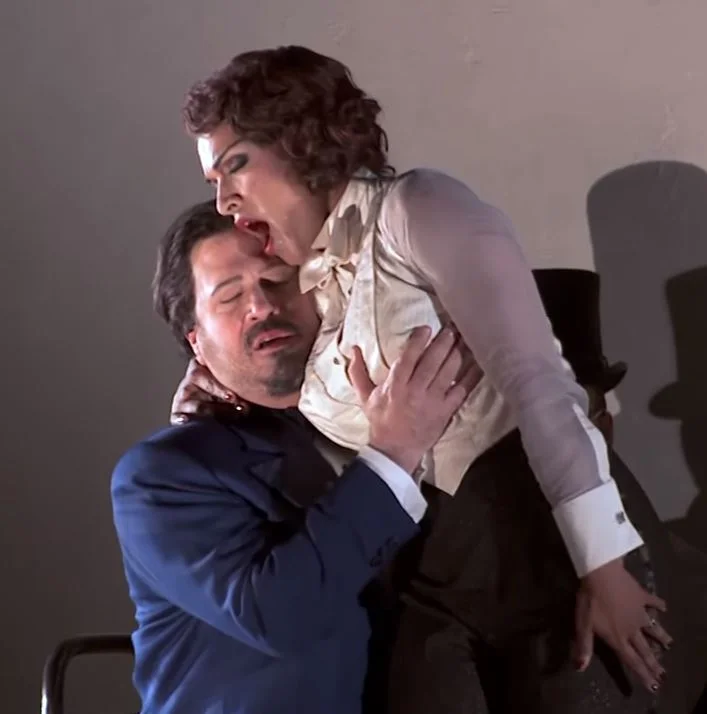Die Meistersinger at the Royal Opera House
Bryn Terfel and Rachel Willis-Sørensen in Die Meistersinger von Nürnberg, The Royal Opera © 2017 ROH. Photograph by Clive Barda
It’s a mess.
Not musically, but in Kasper Holten’s last production for the ROH as Artistic Director he really hasn’t come to terms with the complexities of the piece and too many gimmicks abound, which simply do not make sense. His production of Eugene Onegin was poor, but in some respects this production is really awful.
The large opening act set designed by Mia Stensgaard is used in all 3 acts to varying degrees of relevance. The action takes place in a 1920’s/30’s livery hall with the large gothic/art nouveau set making movement around the stage difficult. In the second act the substance of the stage allows for no interpretation of outside space and thus the transposition between Eva and Magdalene, when Beckmesser comes calling, falters as there is no balcony for Magdalene to be wooed from and instead she prances on the stage dancing to the music. This is plainly nonsense. It gets worse, with the night watchmen dressed as a minotaur in heels and a nightmare riot scene, missing the point entirely and instead becoming the modern rendition of zombie apocalypse. In the third act the silliness climaxes so that we are no longer in a cobblers shop, but in a tailors place and Eva, instead of being happy at Walthers volte face in joining the masters and taking her hand in marriage, gets angry and stomps off stage leaving Beckmesser undressed in his vest lying on a bench. There are even more silly things in the third act, including an annoying flashing red light on stage, drinking coffee from a Pret cup, water from an electric water dispenser, taking pictures on a mobile phone and in act 2, Beckmesser playing on an old piano instead of a lute……..and so it goes on. All this from a 1920’s/30‘s production and all designed to annoy.
The Conductor, Antonio Pappano, is a great interpreter of Wagner’s music, but his act 1 prelude started like an express train in the same way that his act 3 prelude was so slow that it almost came to a stop. In between, he shaped the music beautifully, although there were moments where the balance between music and voice was slightly out of kilter. There were some strong performances, particularly from the Magdalene of the Polish soprano, Hanna Hipp, who was, until 2013, a Jett Parker young artist and the young British tenor, Allan Clayton, as David. The American, Rachel Willis-Sorensen, was an adequate Eva and Gwyn Hughes Jones, her suitor as Walther, who was dressed as a vagabond instead of the Knight that he was meant to be, sang outstandingly. The Danish bass baritone, Stephen Milling, has sung all over the world and performed here the role of Pogner, but his voice at times seemed tired in contrast to the Beckmesser of Johannes Martin Kranzle, who gave us a superb and pitiable portrayal of the role. And so we come to the Hans Sachs of Bryn Terfel, who husbanded his vocal resources in act 1 and 2, but gave us a great portrayal of the role in act 3 with wonderful pathos culminating in a great quintet between the singers.
Overall, a great disappointment for one of the great operas and unfortunately comes nowhere near to the recent superb Richard Jones production for ENO nor the previous ROH production by Graham Vick.
With kind regards,
David
David Buchler
Saturday, 11 March 2017







